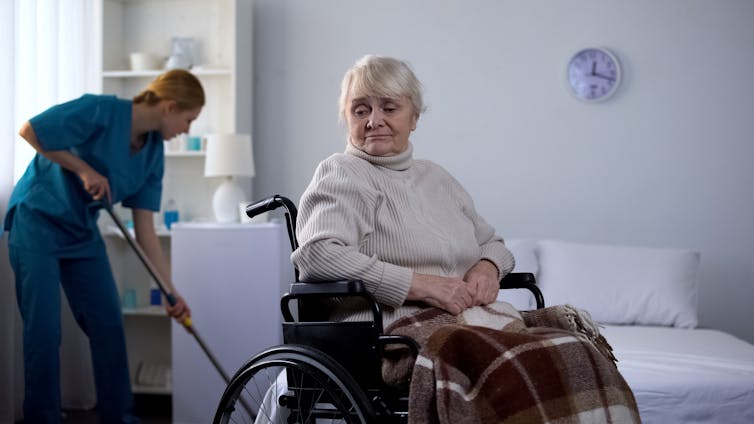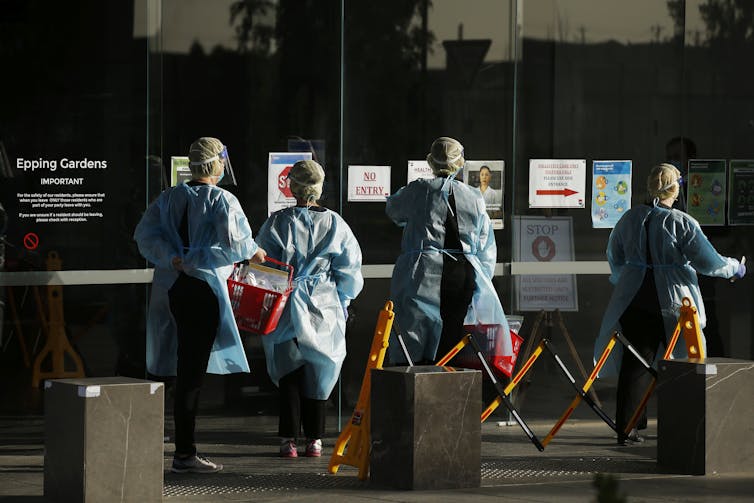Aged-care facilities need accredited infection control experts. Who are they, and what will they do?
- Written by Philip Russo, Associate Professor, Director Cabrini Monash University Department of Nursing Research, Monash University
The Royal Commission into Aged Care Quality and Safety last week released a special report looking at the sector’s response to COVID-19.
Finding the federal government did not adequately prepare residential aged care to deal with a pandemic, the commission made several recommendations designed to safeguard residents moving forward.
One was that the federal government should arrange with states and territories to deploy “accredited infection prevention and control experts” into aged-care facilities to better prepare for, and assist with, management of outbreaks.
But who are these accredited infection prevention and control experts, and what will they actually do?
First, why do aged-care facilites need this?
Infection prevention and control is well established in hospitals and acute care facilities. In Australian hospitals, there’s an average of one full-time infection prevention nurse for every 152 beds. Hospitals typically have an infection control committee, which is ultimately accountable to the hospital board.
By definition, aged-care facilities are not considered to be health-care facilities. Rather, they are social-care settings designed to mimic a home environment as much as possible.
While this is important for residents, this difference can present a range of challenges from an infection control perspective. Unlike hospitals, aged-care facilities typically have various communal areas for socialising, dining and activities, where groups can gather and come into close contact.
 Aged-care facilities have a range of communal spaces for residents.
Shutterstock
Aged-care facilities have a range of communal spaces for residents.
Shutterstock
Recent research found while Australian hospitals are guided by different national and state-based standards and guidelines, aged-care facilities generally manage infection control arrangements themselves.
Only 23% of Australian aged-care facilities surveyed had a dedicated infection control committee. More than half reported a lack of staff with specialised qualifications and experience in infection prevention and control.
Read more: Federal government did not prepare aged care sector adequately for COVID: royal commission
Enter infection prevention and control experts
The royal commission report noted high-level infection control expertise was needed:
to assist with the preparation and implementation of outbreak management plans
to provide training to staff on the use of personal protective equipment (PPE) and infection prevention and control
to provide assistance on day one of an outbreak.
 COVID-19 has highlighted the importance of infection control in aged care.
Shutterstock
COVID-19 has highlighted the importance of infection control in aged care.
Shutterstock
Besides the accredited infection prevention and control experts, the commission recommended all aged-care facilities should have one or more trained infection control officers as a condition of accreditation.
This could be a registered nurse who has specific training in infection prevention and control. Importantly, they should have access to expert resources and be capable of implementing infection prevention programs.
Employers would be required to support these nurses to take the infection prevention “champion” role, and under the close supervision and guidance of the accredited experts, they could prepare plans for outbreaks like COVID-19.
These plans would include ongoing education around the use of PPE, procedures regarding how to manage residents who become infected, and trigger points for escalating responses.
The COVID-19 crisis in residential aged-care facilities, particularly in Victoria, has shown us how important it will be to have strong and experienced leaders overseeing these plans, and the management of any ongoing and future outbreaks.
Read more: Poor ventilation may be adding to nursing homes' COVID-19 risks
So how are the experts accredited?
The Australasian College for Infection Prevention and Control (ACIPC) is the peak body for infection prevention and control in the Australasian region. It provides “credentialing” for professionals who want to become accredited infection prevention and control experts.
There are three levels of credentialing: primary, advanced and expert. Qualifications and experience determine the level a person attains, but the system is designed so those commencing at the “primary” level can progress to “expert”.
A panel of existing accredited infection prevention and control experts reviews all applications.
They evaluate whether the applicant meets several criteria across five domains: relevant vocation, prerequisites, knowledge, attitude and practice. Criteria include professional qualifications, awards, experience, continuing education, professional activities, and research.
Once credentialed, each member must apply for their accreditation again every three years.
 The infection prevention and control experts will be charged with preparing outbreak management plans, among other things.
Daniel Pockett/AAP
The infection prevention and control experts will be charged with preparing outbreak management plans, among other things.
Daniel Pockett/AAP
Right now, there aren’t enough
The relationship between certification status of health professionals and the quality of patient care they provide is clear.
In particular, hospitals with infection control programs led by certified or credentialed infection control practitioners have fewer health care-associated infections when compared to those led by non-certified infection control practitioners.
Read more: Older Australians deserve more than the aged care royal commission's COVID-19 report delivers
According to the ACIPC database, there are currently around 62 accredited infection prevention and control experts in Australia, of whom 42 are at expert level. All are nurses.
The royal commission acknowledged this small number as a limitation. It reflects the fact employers so far haven’t generally required their staff to attain this accreditation — so there’s been little incentive.
But COVID-19 has necessarily changed this. In the short term, facilities must establish a relationship with a local accredited infection prevention and control expert who can support their staff.
Looking forward, employers and providers should be incentivised to support staff to seek higher infection prevention training, and ultimately undergo credentialing.
Authors: Philip Russo, Associate Professor, Director Cabrini Monash University Department of Nursing Research, Monash University




